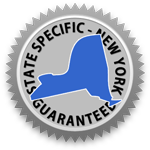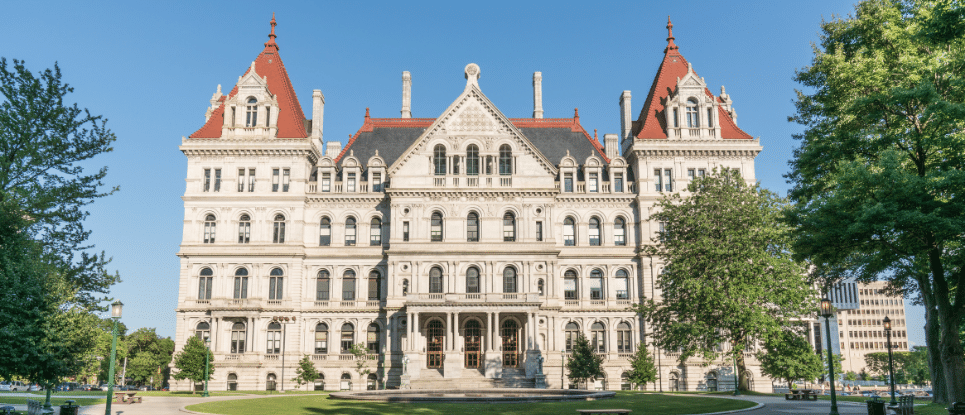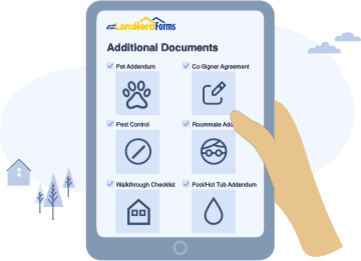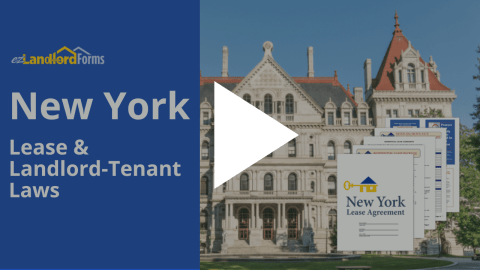New York Lease Agreement with ezSign
Pro Form: Create a Pro Account to access this form
5 Stars
Create and Download the New York Residential Lease & Rental Agreement printable PDF for Landlords. This state-specific Lease is customizable and includes NY laws.
Document Last Modified: 11/6/2023
Document Features
Uses Lease Builder
State-Specific
ezSign
Related Documents
Pro Tip: Before signing a New York Residential Lease Agreement, always do thorough Tenant Screening to reduce the risk of a bad outcome.
Watch Our Videos
▶ This is Why a Lease is so Important
▶ How to ezSign your Lease Agreement
Video to Share with Tenants
Table of Contents
- New York Lease Agreement
- NY Landlord-Tenant Laws
- Required Disclosures
- New York City (NYC) Rental Agreement
- Frequently Asked Questions (FAQs)
- Other Popular Forms
- New York State Specific Documents
- Rental Lease Agreements for Nearby States
New York Lease Agreement

New York Landlords must comply with all New York State Lease laws. This means that a basic Lease or standard Lease Template isn’t enough. Instead, you need a state-specific Lease to protect you and your investment.
This can seem complicated, but we make it EZ.
Our New York Rental Agreement is guaranteed to comply with all state laws.
- We offer state assist tips as you build your Rental Lease Agreement
- We automatically include any state-required language, clauses, or terms
- We automatically include any state-required disclosure or addenda
This gives you so much more than just a standard template or a free Lease form. A good Lease means:
- Complete protection
- Peace of mind
- Better rental outcomes
- Increased return on your investment
- You’re set up for success as a Landlord

Rated “excellent” 4.8 from 5,000+ reviews on Trustpilot
With our Lease Builder Wizard:
- Just follow simple prompts to customize your Lease entirely online.
- It’s Guaranteed to comply with all NY laws.
- You can just check boxes to add any additional terms, documents, or disclosures that you want.

NY Landlord-Tenant Laws
Both New York City and the State of New York have complex Landlord-Tenant laws that Landlords need to know and follow. This is true for all types of rental properties, including apartments, condos, duplexes, single-family homes, and multi-family buildings.
To help make you a Pro Landlord, below is an overview of those requirements.
Note: Our New York Lease Agreement complies with all New York State and New York
City Landlord and Tenant laws.
Use our Lease Builder Wizard to create both short and long-term NYS and NYC Lease
Agreements.
| Category | State Law |
|---|---|
|
Ending and Renewing |
If a tenant has a lease of less than one year, a 30-day notice is now mandatory to end the lease. A 60-day notice is required for renters who have lived in an apartment for more than one year, but less than two years, or have a lease of at least one year, but less than two years. Tenants who have lived in a unit for more than two years, or have a lease of at least two years, must get a 90-day notice. Additionally, the same notice timeframes listed above apply if the landlord intends to raise the rent for a unit of more than 5%. Landlords of regulated apartments are required to give 90- to 120-day notices to end the lease. |
|
Security Deposit |
Security deposit for all properties (formerly this only applied to most rent-regulated properties) is now limited by law to one (1) month's rent. Additionally, landlords must now return security deposits within 14 days of the tenant leaving the unit, along with an itemized statement covering any deductions made. If the apartment is in a building with 6 or more units, the landlord is required by law to place the security deposit in a separate interest-bearing bank account in New York State. The Landlord must then notify the tenant concerning the bank in which it's being held. The landlord may keep 1% of the amount deposited per year for administrative expenses, the remaining interest is to be paid annually to the tenant or left to accumulate at the tenant's option. The landlord must return the security deposit, less any lawful deduction, to the tenant at the end of the lease or within a reasonable time thereafter. If the damage was done, the landlord may apply part or all of the security deposit to the cost of repair. |
|
Returned Payment Fee |
A dishonored check charge must be specified in the lease and may not exceed $20. |
|
Late Fee |
Landlords cannot charge late fees until rent is five days late and the late fee cannot be more than $50 or 5% of the monthly rent, whichever is less. |
|
Insurance Requirements |
For rent regulated apartments, the landlord may not require the tenant to obtain renter’s insurance because this effectively requires the tenant to pay a fee in excess of the legal regulated rent. |
|
Addenda & Disclosures |
New York Assist: If the leased premises was constructed prior to 1978 (or prior to January 1, 1960 within New York City limits), the landlord must provide all tenants with the Lead-Based Paint EPA Disclosure and the Lead-Based Paint EPA Pamphlet. Sprinkler system notice: Every residential lease shall provide conspicuous notice in boldface type as to the existence or non-existence of a maintained and operative sprinkler system in the leased premises. If there is a maintained and operative sprinkler system in the leased premises, the residential lease agreement shall provide further notice as to the last date of maintenance and inspection. NYC: Local Law 117 requires that the property owner of multiple dwellings provide stove knob covers for gas-powered stoves where the owner knows or reasonably should know that a child under six years of age resides. |
|
Notice to Enter |
Reasonable notice is required except in an emergency. |
|
Landlord Requirements |
Electronic Rent Payments: A landlord shall not require a lessee or tenant to use an electronic billing and/or payment system as the only method for the payment of rent. Owners must ensure that buildings are safe, clean and well maintained, in both common areas and in individual apartments. Among other responsibilities, owners must provide and maintain security measures, heat, hot and cold water, good lighting and make repairs to keep the building in good repair. |
Required Disclosures
New York law requires that certain addenda and disclosures be included in the Lease Package. In addition to statewide requirements, there are some NYC rental requirements that Landlords should know.
Note: When you build a Lease Agreement with our Lease Builder Wizard, all New
York-required documents, language, and disclosures are automatically included.
Disclosures required in NYC:
- Bed Bug Disclosure: If a unit has a history of bed bugs, Landlords are required to disclose any bedbug infestation history. (NYC Admin Code § 27–2018.1)
- Smoking Policy: In buildings with 3 or more rental units, Landlords must have a policy stating where smoking is prohibited. (NYC Admin Code 5, § 17-505)
- Stove Knob Covers: If a Tenant has children under the age of six (6), the Landlord must provide knob covers for gas-powered stoves. (NYC Admin Code § 27-2046.4(a))
- Window Guards: If a Tenant has a child that is ten (10) years or younger, the Landlord must equip the rental unit with window guards. (NYC Admin Code § 27–2043.1)

State-wide Required Disclosures:
- Copy of Signed Lease: For rent-stabilized Tenants, the Landlord must provide the Tenant with a signed copy of the Rental Lease Agreement within thirty (30) days of the start of the Tenancy. (Tenants’ Rights Guide)
- Lead-Based Paint Disclosure: Pursuant to federal law, Landlords must provide Tenants with a lead-based paint disclosure for all residences built before 1978.
- Sprinkler Disclosure: Landlords must provide notice of whether or not a sprinkler system exists. (Article 7, Section 231-A)
Pro Tip: Experienced Landlords create a complete Lease Package that includes all the forms Tenants need, for example:
- Pet Addendum: To cover all pet rules and policies
- Guest Policy: To proactively address guest issues
- Welcome Letter: To provide Tenants with details they need to know about their new home
- HOA Rule Addendum: To make it EZ to share HOA rules
Our Lease Builder Wizard has over 25 disclosures and addenda for Landlords to select!
New York City (NYC) Rental Agreement
Our New York Lease Agreements not only meet all state requirements, but they also meet all New York City (NYC) rental requirements.
- All NYC-specific rules are incorporated into our New York Lease.
- Required documents, like the Window Guard Notice and Rent Stabilization Rider, can be easily attached.

Frequently Asked Questions (FAQs)
Does My New York Lease Agreement Need to Be Notarized?
No, your Lease Agreement is a legally binding contract. It needs to be executed, or signed, by both parties, but it does not need to be notarized.
Can I Write My Own New York Lease Agreement?
Technically speaking, yes, you can write your own Lease Agreement, but it’s not a good idea. The Lease is what outlines all terms of the tenancy and protects Landlords should any issues arise with the property or the Tenant.
It’s the most important document or form that Landlords have, so it’s important that it complies with all state laws and covers all terms, rules, and policies.
It’s the most important document or form that Landlords have, so it’s important that it complies with all state laws and covers all terms, rules, and policies.
All that to say, it’s not a good idea to write your own Lease unless you have experience drafting Leases and are experienced with Landlord-Tenant laws in your area.
Plus, you don’t want just a generic Lease, like the one offered by the New York Association of Realtors. Nor is a blank, fillable Lease a good idea.
You need a Lease that is state-specific, customizable, and comprehensive.
What are the different types of Lease Agreements?
There are a number of different Lease Agreements depending on the type of property and the period of Tenancy. For example, there are Commercial Lease Agreements for commercial properties and Residential Lease Agreements for residential properties, like an apartment, house, duplex, or condo.
Additionally, there are month-to-month Lease Agreements for short-term rental agreements, vacation rental agreements,and fixed-term Lease Agreements, which are commonly one year.
While there are many different types, they all serve the same purpose: to outline the terms under which a Tenant, or lessee, rents property from a Landlord, or lessor.
Why Do I Need a State-Specific Lease?
If you’re renting residential real estate in New York, New York state law is the governing law. This means your Residential Lease Agreement needs to comply with all New York laws.
Start your New York Lease Agreement or apartment Lease Agreement now!
Other Popular Forms
Pro Tip: We have forms and tools for the entire Landlord Lifecycle
- Rental Application: Before renting out a property, it’s vital to have potential Tenants fill out a Rental Application and undergo thorough Tenant Screening, including a credit report, national criminal background report, and eviction history report.
- Move-In/Move-Out Walkthrough Checklist: Used to provide documentation of the condition of the property at move-in and move-out.
- Rent Ledger: Keep your rental records in order with this easy to use Rent Ledger.
New York State Specific Documents
- New York City Rent-Stabilized Rider (Form RA-LR1: This form must be included in all New York City Rental Agreements and renewal agreements for rent-controlled apartments.
- NYC Child Notice for Lead Paint Compliance: This addendum is required for New York City Landlords renting to families with children under the age of 6. It must be provided to Tenants annually - at the signing of the Lease and at the time of renewal.
- New York City Required Annual Notice - Window Guards and Lead Paint: Occupants in buildings with 3 or more units must sign this form annually and give it to their Landlord.
- NYC Lease Renewal for Rent Stabilized Housing: Landlords renewing a Lease with Tenants in rent-stabilized housing must use this form.
- NYC Increase in Rent (for Rent Controlled Units): New York City rent-controlled apartments have complex rules for raising rent. This form makes it EZ for Landlords to comply with all requirements.
- New York Demand For Rent 14-Day Notice: This form is for Landlords that have Tenants that are late with rent. Pro Tip: It must be used before an eviction proceeding can be initiated.
- New York How To Prepare for a Landlord-Tenant Trial: This booklet is a great resource for New York Landlords preparing for a housing trial. It includes the rules and procedures Landlords will need.
- New York Notice to Vacate: This form should be used with Tenants that are violating the Lease but can cure the violation and remain in the property. This form provides Tenants with specifics regarding their Lease violation and the time that they have to cure the violation in order to avoid vacating the property.
- Buffalo Disclosure of Smoking Policy: The City of Buffalo requires Landlords to disclose a smoking policy. This form makes it EZ to do so and complies with Buffalo’s requirements
- Buffalo Rental Registry Information: Buffalo Landlords must register all rental properties. This form provides details on how Landlords do this.
- What Tenants Should Know About Indoor Allergens: New York City law requires that Landlords take steps to keep their Tenants’ homes free of pests and mold.
- New York City Indoor Allergen Disclosure: New York City Landlords of buildings with three or more Rental Units must comply with specific regulations to reduce the risk of indoor allergens like mold and pests. This form outlines those requirements and serves as a disclosure that documents a Landlord's compliance with all requirements.
- Buffalo Disclosure of Smoking Policy: The City of Buffalo in the State of New York requires the landlord to disclose a smoking policy, according to Chapter 264- Rental Dwelling Unit Registration.
- New York Sprinkler Disclosure: Landlords must disclose to the tenant whether there is a sprinkler system installed within the property or not.
- New York City Annual Stove Knob Cover Notice: NYC: Local Law 117 requires that the property owner of multiple dwellings provide stove knob covers for gas-powered stoves where the owner knows or reasonably should know that a child under six years of age resides.
- NYC Lease Renewal Form - EPTA Form RTP-8: This NYC Lease Renewal Form allows landlords to renew a lease with tenants that are enrolled within The Emergency Protection Act.
Rental Lease Agreements for Nearby States
- Pennsylvania Residential Lease Agreement: Our PA Lease Agreement meets all requirements for the state of Pennsylvania and the city of Philadelphia.
- New Jersey Lease Contract: New Jersey has some particularly complex Landlord-Tenant laws. Our Lease Agreement NJ provides state assist tips and includes all NJ required language.
- Lease Agreement Connecticut: Our Connecticut Rental Agreement makes it EZ for Landlords to manage CT rental properties.
- Massachusetts Rental Agreement: Our MA Lease complies with all state laws and provides Landlords with unlimited access to our electronic signing tool, ezSign.
- Vermont Residential Lease Contract: Not many people are familiar with the Landlord-Tenant laws of Vermont, but we are! Take advantage of our expertise to create a great Vermont Lease.
Things to Consider Before You Hand Over Legal Possession of Your New York Rental Property
- Have all Tenants completed a Rental Application and Tenant Screening?
- Do you have a fully executed Lease Agreement?
- Have you received the entire security deposit and first month’s rent?
Why So Many New York Landlords Use Our Products:
We have everything Landlords need from soup to nuts - Rental Applications, Tenant Screening, Free Leases and State-Specific Leases, Property Management Documents, and Move-Out Forms.
Plus, we are Landlords, so we understand what you nee d to make your job EZier - like e-signing tools, automatic cloud storage, and customizable forms.

With our New York Lease, get unlimited access to our electronic signing tool, ezSign.

Your Lease is automatically stored securely on encrypted servers with ezCloudStorage. If you prefer a hard copy, it can be downloaded and saved as a PDF. It’s also printable!

